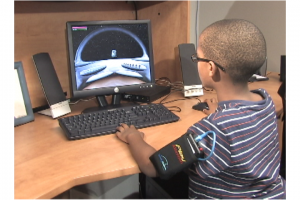Neuro/Bio & Educational Feedback
You really hope your child can learn to slow down and enjoy the simpler things in life. Like playing in the sandbox, hiking through nature, or reading a good book. But, as he grows, he just doesn’t seem to have the patience for the type of things that require him to focus.
Yes, technology has taken over. It’s necessary for social interaction and school work, and it sure has made life easier when you need a bit of space or time to do things on your own. But if you’re honest with yourself, your child is spending entirely too much time using technology to occupy herself and you’re starting to think it’s making an impact.
You’re ready to see your child put down the screen without a meltdown and interact with the world in a conscious, intentional way.
It started as a quick way for you to get a minute to yourself to clean the kitchen or cook dinner. You’d hand over your phone as a distractor and get to work. The games/shows were educational and age-appropriate, so you didn’t think too much about it. It was a great way for you to get 20 minutes to accomplish a task. Your child was learning matching skills, letters, and numbers from the apps and this added benefit excited you. But you noticed it was hard to get your phone back without an argument when dinner was done.
You never thought much of it, believing he was concentrating and invested in the learning games. But as your child’s screen-time increased, you saw more behavior and attention changes than you liked. Your child was more irritable after spending time with technology and he seemed to have trouble concentrating on anything that didn’t have to do with a video game or television show. You talked about how it was still important to be present with friends and family and to relate face-to-face. Some days you’d see him go hours without needing to look at a screen. But on others, he’d be asking for it shortly after waking up.
But you gave still allowed her to play with apps and watch videos as long as you approved them. Thinking as she got older she would find interest in other things and be able to concentrate on books or conversations.
Now, a few years later, you’re worried you didn’t intervene enough.
Your child’s attention span is extremely short, and he has trouble concentrating for more than a few minutes. He is very bright and has knowledge beyond his years. But he lacks interest in most things that don’t have to do with watching tv. Even when he finds something interesting like a book or puzzle, he has difficulty sitting still long enough to finish it. Your child seems to lack the concentration skills to focus on something long-term. He also gets easily upset when you ask him to do something he doesn’t want to do or something that is difficult.
That’s not to say you only care about your child’s intelligence. In fact, you want her to be well-rounded and well-accomplished. You know there are things that will come more easily than others or things she will find difficult. You believe that all children are unique and have strengths and weaknesses that shape them into individuals. And, you want to help your child capitalize on her exceptionality and thrive.
But what you didn’t expect was how much being able to sit still and regulate her emotions would impact your child’s ability to make friends and have relationships with peers. You never imagined your child would be failing school or lacking the motivation and interest to keep enjoying the things she loves. You had no idea that a short attention span would cause her to meltdown or withdraw altogether.
So here you are.
The parent of a super-smart, hyperactive child who has no idea what to do next.
You realized it the other day…
Your family had taken a weekend trip to the mountains. You thought it would be fun to stay in a rustic cabin with no TV and no Wi-Fi. You got out of the car and stepped into the beautiful scenery and fresh air. The kids started running around, playing in the trees, and you thought it was going to be a great mini-vacation. You knew there would be a bit of backlash when your child realized he couldn’t play his games, but you’d brought plenty of books and slower activities for the family to enjoy. But when you brought out the first board game and couldn’t play for 15 minutes without a meltdown, you knew it was going to be a rough weekend.
Your child’s inability to focus shocked you.
You genuinely thought two days screen-free would be fun and easy. That the forest and the mountains would be enough to keep your child happy and occupied. But in that moment, you saw just how hard it was for him to pay attention to simpler, slower things, and to keep from getting frustrated when things didn’t go his way.
You didn’t have many options to change the situation, so the plan changed from appreciating to just surviving the next 48 hours. You could feel the tension and anxiety coming from your child and it was obvious she was having a difficult time coping to a more relaxed, attentive lifestyle.
You’ve been waiting for your child to outgrow this, but now it’s obvious
Your child is overstimulated and overactive.
Regardless of how long you wait or how much room you give him to calm down, your child is still struggling with paying attention and sitting still long enough to accomplish a task. Never mind the fact that his homework and social obligations are only getting more demanding. You absolutely thought he’d find his focus and outgrow some of his distractibility by now, but you’re starting to see that his difficulty concentrating is impacting his emotional reactions.
It’s heartbreaking to see your child struggle to slow down and enjoy life. There are so many expectations to reach certain achievements and hold certain standards and you just don’t know how she’s going to meet these requirements without being able to buckle down and concentrate.

But the truth is, kids can change and there are ways to help them better navigate the demands in their lives. It’s difficult to help your child focus on other things when there are so many distractions in a technological world. Increasing mental clarity and focus is not a one size fits all approach. It requires specialized evaluation and individual plans to ensure you are meeting your child where he is and addressing his particular struggles.
You are not the only parent to worry if your child will ever reach her full potential. We see this every day at Sensory Stepping Stones. The key is continuing to focus on your child’s strengths and developing a plan to address any deficits.
You’re ready to make sure your child is the happiest and most functional he can be, and we’re here to help.
The Neuro/Bio Educational Feedback Program at Sensory Stepping Stones
The Neuro/Bio Educational Feedback Program is designed to enhance your child’s ability to process and learn through the stimulation of his nervous system. After completing this program:
- Your child will achieve improved attention and focus
- Your child will display higher academic performance
- Your child will develop better tolerance of strong emotions such as anger and frustration
- Your child will experience a calmer, more stable mood and be able to self-regulate
- Your child will feel more capable of remembering tasks and details
- Your child will display stronger executive functioning
- Your child will develop appropriate social skills and connect better with peers
- Your child will express more self-confidence
The Neuro/Bio Educational Feedback Process

We will meet together 30-40 times to complete individual Neuro/Bio Educational Feedback sessions. Each session lasts between 45 – 60 minutes and takes place at least two times per week. However, Neuro/Bio Educational Feedback is most typically offered as part of a larger package of programs such as the Sensory Learning Program, Interactive Metronome, and Cognitive/Memory Training.
Although Neuro/Bio Educational Feedback works for people of all ages who have a variety of conditions affecting their cognitive or physical abilities, it is uniquely designed to ensure your child recognizes his progress as it is occurring, increasing his motivation toward therapy and his ultimate recovery or gains in ability.
The Neuro/Bio Educational Feedback Program can also be used with children without a specific diagnosis to tune our distractions and better control their emotions.
The goals of the Neuro/Bio Educational Feedback Program include:
- Improved Focus
- Improved Behavior
- Improved Academics
- Improved Social Interactions
Neuro/Bio Educational Feedback sessions are available seven days a week as a standalone therapy service or as part of larger programs held at the clinic.
More About Sensory Stepping Stones
Sensory Stepping Stones is a center dedicated to providing both traditional and innovative programs to help your child. We combine multiple, evidenced-based treatments into a holistic approach geared toward aiding your child and your family to reach its full potential.
It is our mission to provide specific, holistic programs to enhance your child’s mental, emotional, physical, and functional performance so he or she experiences greater self-awareness, understanding, and growth. Our clinic insists upon creating an atmosphere that encourages your child to learn, discover, mature, and develop positive self-esteem. You can read more about our clinic here.
Who Benefits Most from the Neuro/Bio Educational Feedback Program at Sensory Stepping Stones
The Neuro/Bio Educational Feedback Program is best for those who need help with attention, processing, and emotional regulation. The program helps children recall and remember details better and remain focused at school or home longer.
Your child will benefit from Neuro/Bio Educational Feedback if:
- You have to constantly ask your child to put away electronic devices
- You notice your child does not interact well with peers
- Your child increasingly struggles academically
- Your child has difficulty identifying and controlling emotions
- Your child is easily distracted and has trouble focusing for long periods of time
- You can tell your child feels different and left out and you want to help them feel more comfortable with peers
Your Next Steps
It is possible for your child to feel comfortable and happy without using technology. He will be able to have fun intellectually, physically, and socially with children his own age and not struggle to fit in or feel awkward. You will feel confident knowing he can recognize and control his emotions and remain composed enough to focus on the tasks at hand.
Your child has some difficulty paying attention and staying on track, but that doesn’t mean she cannot train her brain to perform better.
You will be able to send your child outside to play knowing that their imagination is active enough to keep her occupied. You’ll also feel confident that she will have the mental space to concentrate on her school work when the time comes. Ultimately, you can finally relax knowing that your child will figure out how to channel her energy productively and be able to connect with others.
To schedule a free consultation at Sensory Stepping Stones, click here.
What people are saying…
“Our son is a better communicator and conversationalist (his listening skills have improved) and is calmer and less overwhelmed in busy, dynamic places (especially school). His reading speed and attention have also improved, which helps him comprehend better. Extended family has commented that he has ‘matured’ and in school he has stopped requiring his attentional medication.”


